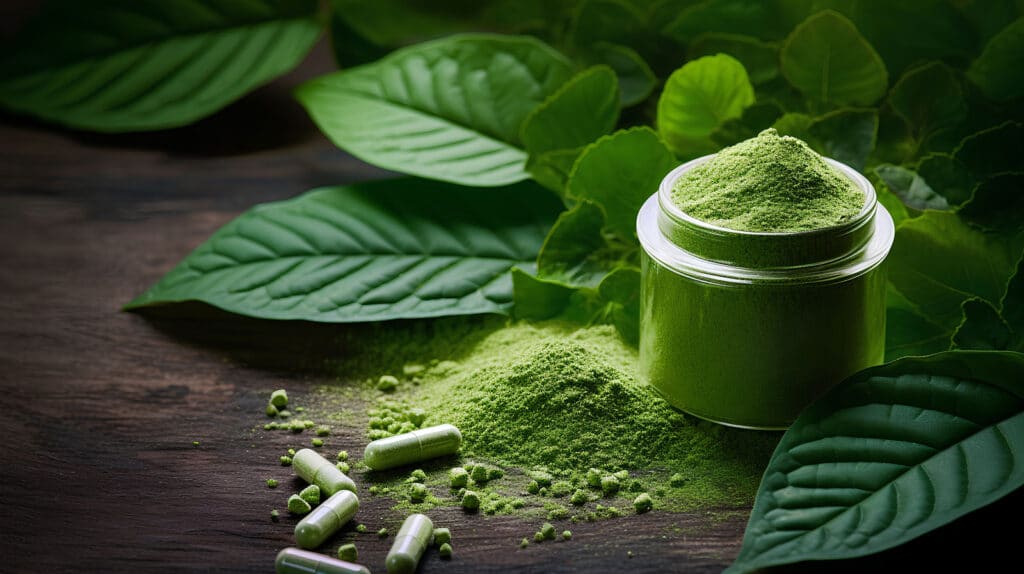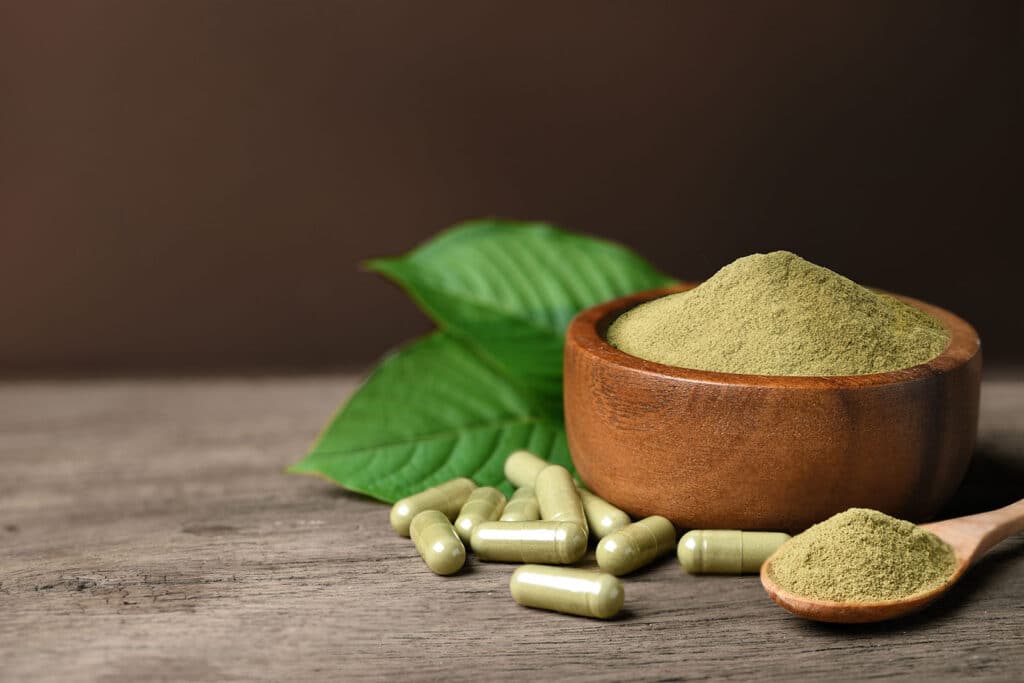Kratom Addiction Treatment in New Jersey
Kratom is one of the drugs used to temporarily transition from opioid addiction to a sober state. It provides opioid-like effects with a lesser risk of addiction.

Ironically, some people end up getting addicted to kratom instead, putting them in a closed loop of struggling with potentially severe withdrawal symptoms.
If you seek substance abuse treatment, and you live or can get to New Jersey, You should pay us a visit at the Garden State Detox Treatment Center. In this guide, we’ll show you just why.
What Is Kratom?
Kratom, also known as Mitragyna speciosa, is a tree that’s native to Southeast Asia. Its leaves contain compounds called alkaloids, primarily mitragynine and 7-hydroxymitragynine. As such, it’s not an opiate, but it can still interact with opioid receptors in the brain and body.
Accordingly, the analgesic effects produced by kratom are similar to those of opioids. As of writing this, kratom isn’t approved by the FDA as a prescription or an OTC drug. However, Kratom isn’t as addictive as opioids, which is why it’s legal in most states.
Currently, and according to the 2023 official kratom regulation report, there are only six states where kratom is illegal to use. Those are:
- Alabama
- Arkansas
- Indiana
- Rhode Island
- Vermont
- Wisconsin
Note: Despite being addictive, kratom doesn’t pose such a high risk as opioids (like fentanyl, which is a potent analgesic approved by the U.S. Food and Drug Administration)
Uses of Kratom
Despite not being approved for OTC or prescription purposes, people still manage to get their hands on kratom and use it for the following purposes:
1. Pain Relief
Kratom has been traditionally used as an analgesic to alleviate various types of pain, including chronic pain, muscle pain, and pain associated with conditions like arthritis and fibromyalgia.
2. Opioid Withdrawal Management
Kratom is sometimes used in treatment programs to help through the detoxification process of opioid use disorder and other types of drug abuse.
When opioid addiction is severe, kratom can be used to gradually reduce the cravings without causing serious physical and mental health conditions to the patient.
Note: This approach is best to be used by healthcare providers in inpatient treatment centers and should never be attempted at home.
3. Stimulant Effects
At low doses (1-5 grams), kratom can act as a stimulant, increasing energy levels, boosting mood, and enhancing focus and motivation.
Note that this use of kratom isn’t recommended at all. Kratom may not be highly addictive, but repetitive kratom use can create drug tolerance, which forces the user to take more, risking addiction.
4. Anxiety and Depression Management
Some people use kratom as a self-treatment for depression and anxiety symptoms.
According to a 2021 study, kratom can indeed cause some alleviation of anxiety and depression. However, further research is needed to get a clearer scope of this.
In other words, the efficacy and safety of using kratom for these conditions are not well-established.

How Does Kratom Cause Addiction?
Kratom causes addiction through one or more of the following scenarios:
Opioid Receptor Activation
The main active compounds in kratom, mitragynine, and 7-hydroxymitragynine, bind to and activate the opioid receptors in the brain.
This produces effects similar to opioid drugs, such as euphoria, pain relief, and sedation.
Over time, the brain can become dependent on these compounds, leading to physical dependence and withdrawal symptoms when kratom use is discontinued.
Tolerance and Dose Escalation
With regular kratom use, the body develops tolerance to its effects, requiring higher doses to achieve the same level of desired effects.
This dose escalation can quickly lead to physical dependence and may develop a full substance use disorder.
Further, excessive kratom abuse and frequent intake of high doses may lead to kratom toxicity, often requiring hospitalization.
Psychological Dependence
Since kratom produces euphoric and mood-altering effects, it can lead to psychological cravings and habitual use for the purpose of chasing those desirable effects.
This psychological kratom dependence is yet another factor contributing to the development of addiction.
Reward and Reinforcement
Kratom’s activation of the brain’s reward pathways and the release of neurotransmitters like dopamine can reinforce addictive behavior.
This makes it harder for users to quit despite negative consequences.
Side Effects of Kratom Addiction
Kratom addiction has a list of side effects that vary in severity depending on the degree of dependence:
Physical Kratom Withdrawal Symptoms
Trying to quit kratom dependence without professional help can lead to the following symptoms:
- Nausea and vomiting
- Muscle aches and pains
- Insomnia and sleep disturbances
- Sweating, runny nose, and chills
- Tremors and shakiness
- Intense cravings for kratom
- Irritability and mood swings
Physiological Effects
Prolonged kratom use can have various physiological effects on the body. These include, but aren’t limited to:
- Weight loss and appetite suppression
- Increased risk of dehydration
- Constipation
- Dizziness and vertigo
- Respiratory depression (in high doses)
Psychological Effects
In addition to physical dependence, kratom addiction can also take a toll on an individual’s mental and emotional well-being.
Users may experience depression, anxiety, difficulty concentrating, emotional instability, paranoia, and even delusions in some cases.
A loss of motivation, apathy, and a general lack of interest in activities they once enjoyed can also occur, further exacerbating the psychological impact of the addiction.
In some severe cases, kratom may even cause suicidal thoughts. A 2022 case report involved a 38-year-old woman with a history of major depressive disorder and opioid use disorder who became addicted to kratom after switching from Suboxone.
She eventually attempted suicide and exhibited kratom withdrawal symptoms.
Hormonal Imbalances
Kratom addiction can disrupt the normal balance of hormones in the body, leading to potential hormonal imbalances.
This can manifest in various ways, including sexual dysfunction, irregular menstrual cycles, and other hormone-related issues.
The exact mechanisms behind these imbalances are not fully understood, but they may be related to kratom’s interactions with the endocrine system.
Increased Risk of Infectious Diseases
People who are dependent on kratom, particularly those who inject the substance, are at an increased risk of contracting infectious diseases.
Sharing needles or other injection equipment can potentially expose users to blood-borne pathogens such as HIV, hepatitis B, and hepatitis C.
Social and financial Consequences
Kratom addiction can have far-reaching social and financial consequences for the individual and their loved ones. The most damaged aspect will likely be the individual’s family and friends.
Additionally, maintaining employment or pursuing education can become increasingly difficult, leading to potential job loss or academic struggles.
Last but not least, the financial strain of sustaining a kratom addiction can be significant, as the costs of obtaining and using the substance can quickly accumulate.
How to Treat Kratom Addiction in New Jersey?
If you live in New Jersey and require assistance with kratom, we welcome you to contact us at the Garden State Detox Treatment Center. Our treatment options include (but aren’t limited to):
Medically-Assisted Detox
The first step is getting kratom out of your system through our medically-assisted addiction treatment program.
Our experienced clinical team provides a tailored treatment plan and round-the-clock care and medication management to alleviate uncomfortable drug addiction withdrawal symptoms.
We ensure this difficult initial phase is as safe and comfortable as possible using medications like buprenorphine and methadone, and we also provide detox from opioids, alcohol, benzos, cocaine, and heroin.
Inpatient Rehabilitation
Our inpatient residential program offers a structured healing environment.
Clients reside at our facility with 24/7 support as they participate in individual and group therapy, counseling, life skills education, and holistic wellness activities.
This allows you to focus 100% on your recovery, free from external triggers.
Outpatient Treatment
If you have responsibilities at home or work, our outpatient programs provide flexibility through regular therapy sessions.
These programs often involve 12-step meetings, support groups, relapse prevention planning, and individual counseling.
Cognitive-behavioral Therapy (CBT)
Cognitive-behavioral therapy (CBT) is a widely used and effective form of psychotherapy in addiction treatment.
CBT helps individuals identify and modify negative thought patterns and behaviors that contribute to their addiction, improving their overall behavioral health.
Through CBT, individuals learn coping strategies, and relapse prevention techniques, and develop healthier ways of thinking and behaving, which can greatly improve their chances of long-term recovery.
Final Words
Kratom may not be highly addictive, but it’s still a risk, which is why it’s not approved by the FDA. If you or a loved one suffer from dealing with it, we are waiting for you.
Even if you’re not currently in New Jersey, our TeleTherapy program will provide all the help you need from the comfort of your home.
Contact us today by phone, or visit us at: 75 Sparta Ave – Newton, NJ 07860
Sources
- Fibromyalgia | CDC
- Drug Tolerance | National Cancer Institute
- Can You Use Kratom for Depression and Anxiety? | Healthline
- Kratom Use for Depression/Anxiety Self-Management | NCBI
- Kratom | NCBI
- Kratom, an Emerging Drug of Abuse, Raises Prolactin and Causes Secondary Hypogonadism | NCBI
- A Case of Severe Kratom Addiction Contributing to a Suicide Attempt | NCBI
- What is Cognitive Behavioral Therapy? | American Psychological Association (APA)

